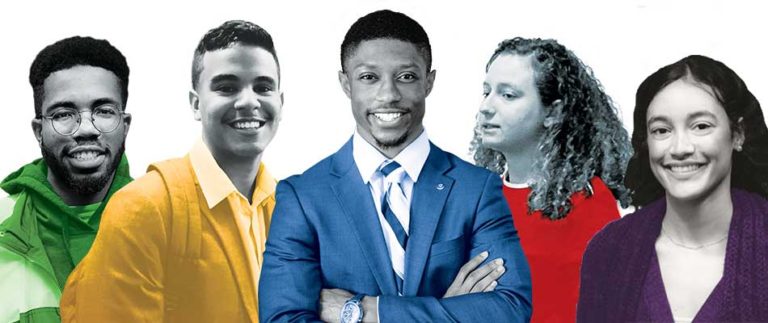For many college students from families of limited means or non-traditional backgrounds, college poses challenges beyond the cost of admission. Cultural transitions, time management, complicated home lives and a sense of belonging are all factors that can make the difference between success and failure.
That’s why each year Drexel’s Liberty Scholars program helps 50 academically talented, financially disadvantaged graduates from Philadelphia high schools overcome hurdles like these by building a community from their first year of college to their last.
“When you come to Drexel, realization can slap you in the face very quickly,” says Bernetta Millonde, the director of diversity initiatives and community relations for undergraduate admissions at Drexel. “[We give scholarship recipients] the mindset where, ‘You are resilient beyond what you think.’ You may have a shortfall in a skill set, but we can help you get there if you go to the resources that we’re outlining for you.”
The Liberty Scholars program was created nine years ago when then-Mayor Michael Nutter called upon local institutions to play a role in increasing the number of college-educated Philadelphians. Drexel pledged to provide 50 full scholarships a year and created the Liberty Scholars program to support recipients through graduation. Scholars receive an assigned mentor, mandatory and optional monthly events aimed at building a supportive learning community, and opportunities to grow through programming, such as study abroad information sessions and financial literacy workshops.
The program has been a huge success, with a 97.4 percent retention rate and an 86.1 percent average six-year graduation rate that surpasses overall Drexel averages. To date, it has helped 171 students graduate who might otherwise have been unable to afford college at all.
As we approach the 10-year anniversary of the program, Drexel Magazine spoke to some past and present Liberty Scholars about how the program has impacted their lives.
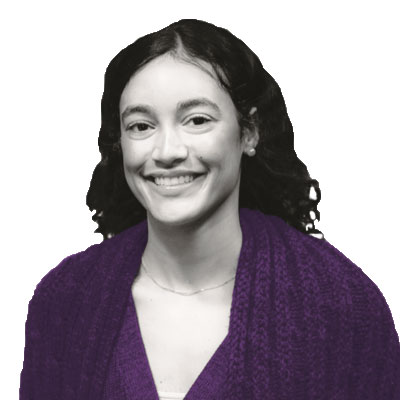
Shania Smith* After graduating in summer 2019, Shania Smith joined Drexel’s Baiada Institute for Entrepreneurship incubator to work on her edtech app startup called Invure; as of press time she is moving to California to join the business leadership program at LinkedIn — where she had co-op’d in the past — and develop her app part-time
The Upperclassman
“If I hadn’t received it, I don’t think I would have ended up here,” says Shania Smith,* who at the time of this interview was a fifth-year marketing student in the LeBow College of Business, of the Liberty Scholars scholarship.
In her time here, Smith has taken full advantage of campus life by living on campus all five years, studying abroad, becoming a resident assistant, being involved in both college- and University-level organizations, and co-oping at a startup on the West Coast as well as attending the annual Forbes 30 Under 30 Summit.
“I feel like I’ve been able to do everything that I probably would have wanted to in college,” she says.
Not that it wasn’t challenging in the beginning. Smith had been near the top of her class at New Foundations Charter School in Northeast Philadelphia. But her high school didn’t offer AP classes or college prep, and at Drexel she had to catch up in first-year English and math classes.
“You have to push yourself harder to perform at the same level, if not above, other students,” Smith says. “It was kind of a wake-up call because you’re thinking, ‘I’m coming from high school. I graduated third in my class. I’m going to do fine.’ And then you get into your first few courses and you’re like, ‘Why am I not getting all A’s on my assignments?’”
If I hadn’t received [the scholarship], I don’t think I would have ended up here,” says Shania Smith, who is now working at LinkedIn.
Even though she grew up nearby, University City was so new to her she felt she might as well have moved across the country.
“I tell my [dorm] residents this: Drexel is a bubble,” she says. “For me, it’s sort of like you can disconnect campus from the rest of Philadelphia because it’s very different.”
Smith says that staying in Philadelphia for college also means Liberty Scholars like herself remain close to the challenges that home can bring. Because of this, the opportunity to live on campus can be even more enjoyable and important.
“It definitely shapes how much you’re able to get from a school, based on how present you are here,” she says.
Smith takes time to mentor underclass Liberty Scholars — a service she valued herself during her first years at Drexel. She advises her mentees to push themselves and not be satisfied by simple goals.
“I think a lot of us come in [to college] with a very limited view of what we can do,” she says. “I think we can all achieve and be really great.”
The Freshman

Chike Onuchukwu † He is now a second-year chemistry student.
Education was always a big deal in Chike Onuchukwu’s family, and after graduating from Central High School in North Philadelphia, he felt pressure to choose a STEM major. That meant a schedule packed with labs and recitations during his freshman year.†
“It’s really hard,” Onuchukwu reflects. “Every day I have at least three classes, so it kind of gets annoying when you see friends in other majors, and they’re chilling. They only have a class a day. It’s kind of frustrating. But whatever, it’s college.”
Fortunately, his high school programming was pretty rigorous, and when he graduated, he felt college ready.
“I’m fine here, it’s just more effort, so that’s something that I’m working on,” he says.
To make time to focus on academics, Onuchukwu decided to forgo joining the club soccer team, despite qualifying for it.
“Drexel is just too fast,” he says. “You can’t slip up on anything. Once you slip up, that’s your A. So definitely do whatever it takes to put your academics first.”
He’s seen other Liberty Scholars he enrolled with struggle and drop out, but he says the program has done everything possible to make sure he has all the resources he needs to succeed. He calls Millonde a “second mom.”
When he feels too much stress to do well, he keeps his graduation goal in mind and recommends the same to others.
“It seems like a lot of pressure,” he says. “Just try to ignore that and do your best. Don’t listen to outside factors. … Try not to think of those voices in your head.”
The Commuter
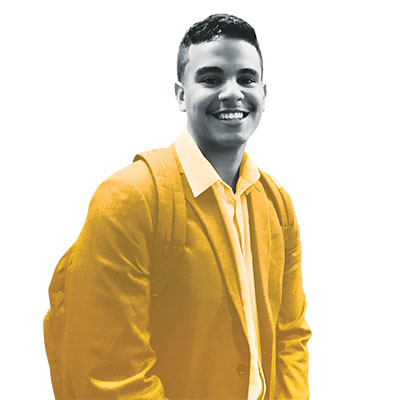
Ramon Gonzalez Jr.• He is now a fourth-year student.
Ramon Gonzalez Jr., a third-year student majoring in management information systems in the LeBow College of Business,* still remembers packing up his room in Millennium Hall after his freshman year, knowing that he’d be moving home to become a commuter student.
“I was, like, ‘I could have done this a little better,’” he remembers. Gonzalez got caught up in grass-is-greener thinking, because when he was living on campus, he often wanted to be home with his family and longtime friends, and once he moved home he wished he were still on campus.
“Once I started commuting, it was a little more difficult for me to be on campus,” he says. “I would come for class and some club meetings here and there, but you’re not on campus all the time and you don’t know what’s going on all the time simply because sometimes you just don’t want to take the commute.”
Despite this, commuting is now working well for him. The decision all came down to cost and convenience, like not having to move on and off campus for every co-op. Plus, being home means eating his mom’s homecooked meals. Gonzalez’s family is from the Dominican Republic, and he and his siblings are the first generation to go to school in the United States.
Gonzalez can get some work done at home, where having his own room minimizes distractions. But when he has to be “in the zone,” he’s here on campus, sometimes at night and on weekends.
“Sometimes I’ll be here really late, or if I have group projects, I’ll be here even on days that I don’t have class,” he says.
As a commuter, the thing that most helps him stay connected to campus is the community created by the Liberty Scholars program, he says. Having a cohort of 50 students like him was a network he could lean on right away, and it helped with the initial college transition.
Coming from Northeast High School — a large, public school — he felt at a disadvantage to students from smaller private schools, despite taking a host of AP classes.
“At the end of the day, they’re just ahead,” he says of students from more elite backgrounds. “It’s a curve that you have to catch up to. The University can’t slow down to the point where the private school kids are like, ‘Why am I here?’ And they can’t speed it up, so it’s a transition. You’ve got to find a middle ground, even if that’s putting more hours in than everybody else.”
The Liberty Scholars program tries to help students feel like they belong, he says.
“A lot of kids … feel like they’re not supposed to be here,” he says. “I think it’s a collective effort to make everyone feel like they should be here.”
“A lot of kids… feel like they’re not supposed to be here,” says Ramon Gonzalez Jr. “I think it’s a collective effort to make everyone feel like they should be here.”
The Graduates
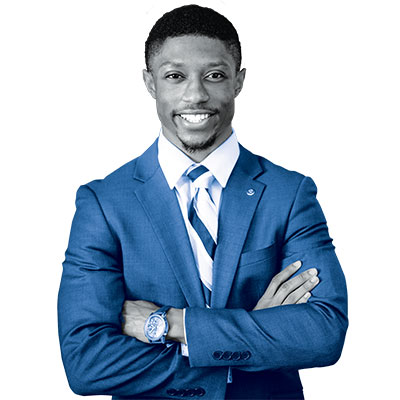
Shahmar Beasley
For recent alumni Michelle Torelli (BS chemical engineering and MS environmental engineering ’18) and Shahmar Beasley (BA political science and anthropology ’18), college was a very go-it-alone experience.
Both were first-generation college students who relied heavily on the Liberty Scholars program for help adapting to college life. “
“At home, I don’t have anyone to look back on when it comes to college or engineering,” says Torelli, who now works as an advanced engineer for global support for one of the 10 largest publicly traded corporations in the world. “So mentorship was an important thing for me in the Liberty Scholars program.” She has continued to seek out mentors in the workforce to compensate for sometimes feeling different from fellow employees who come from families with generations of engineers. Her only quibbles about the program is that it needs more post-graduation support for alumni (something Millonde is already working on) and perhaps mental health support beyond the counseling center because, “a lot of us have bad problems at home,” she says.
Beasley was in the same boat, and he struggled to find his footing at the beginning. “When I first came, I tried to do a little bit too much,” he says. “I joined the mock trial team literally a couple weeks after I got to campus. It’s very intensive — you have to travel a lot, you have to study up a lot, you have to memorize literally these long scripts of paper. … The Liberty Scholars program let me know there were a ton of resources available if I needed tutoring or anything.” Being first-generation didn’t stop these former students from taking on aggressive goals to get the most out of the college years. For Torelli, this included taking 23 credits during more than one term of her college career.
“A lot of people say I’m an extrovert and very determined,” she says. But she says she “absolutely” wouldn’t be in the prestigious engineering position she is today if not for the opportunity the Liberty Scholars program provided.
“The program helps broaden people’s perception of the demographic of this type of student,” Bernetta Millonde says. “Low income, many firstgen, many students of color, and they are sharp.”
“There are a ton of opportunities here,” agrees Beasley, who was accepted into Drexel’s Kline School of Law and four other law schools (including Notre Dame with a six-figure scholarship) but deferred enrollment to work as a paralegal for Lawrence Krasner, Philadelphia’s high-profile district attorney. “Pretty much anything that you want to do, you can do at Drexel,” he says.
The Future
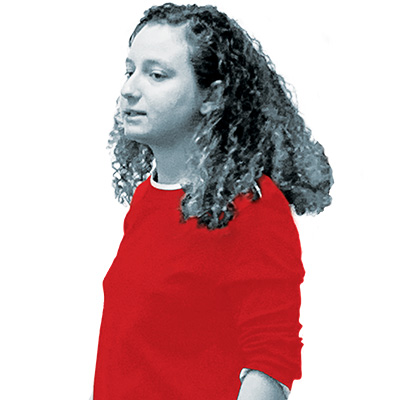
Michelle Torelli
Drexel’s participation in the Liberty Scholars program is now nearing 10 years, but Millonde is still fine-tuning it to focus its philosophy even more on building community and instilling self-advocacy for participating students.
For that reason, cohorts starting this year are assigned to live on campus throughout their Drexel careers.
“We know there is a difference in students’ performance when they’re commuter students versus living on campus,” Millonde says. “We want to make certain that we’re giving them all the advantages of everything that’s happening here on campus, rather than worry about commuting back and forth. And sometimes our students have family responsibilities that can tear at their hearts and pull them away. We’re hoping that being able to keep them more focused will help with that part as well.”
Additionally, the program recently became part of the new Center for Academic Inclusion and Scholarship under the division of Enrollment Management and Student Success, which better connects it to existing student resources. That will help Millonde improve programming, including the creation of post-graduation opportunities so that graduates enter the workforce with confidence.
At its best, the Liberty Scholars makes Philadelphia a stronger city, and Drexel a better learning environment with more voices.
“[The program] helps broaden people’s perception of the demographic of this type of student,” Millonde says. “Low income, many first-gen, many students of color, and they are sharp. I think it helps to enhance everyone’s experience in the classroom.”
For the scholars themselves, it can be a life-changing opportunity.
“We help students learn to advocate for themselves, become more confident in their scholarship, and understand that they earned their seat at the table,” says Millonde. “The Liberty Scholars program changes the trajectory of students’ lives.”
Donor support makes it possible for the Liberty Scholars Program to help academically talented and financially disadvantaged students succeed at Drexel.


